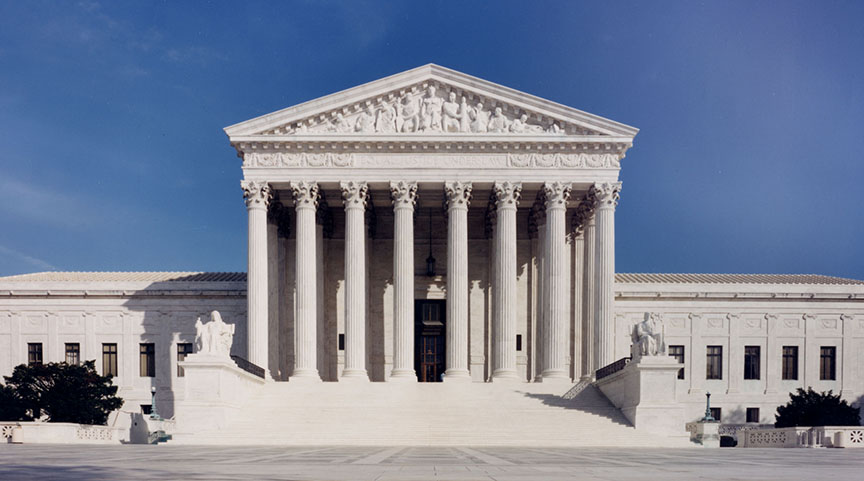By Kenneth Tiven in Washington
In an announcement that surprised almost no one, US Supreme Court Justice Stephen Breyer said he will retire at the end of this court term, giving President Joe Biden his first opportunity for a high court appointment. Breyer at age 83 had hinted at this over the past year. No matter whom Biden appoints, it will not dramatically shake the nine person Court’s ideological balance which at the moment is dominated by seven conservatives, six of whom are white males. Former president Donald Trump had jammed in Amy Coney Barrett at the end of his term to replace Ruth Bader Ginsburg, who had declined to retire while Barack Obama was president, believing a Democrat would beat Trump.
Biden on the campaign trail said he would name an African-American woman to the Court. Court appointments are exempt from the filibuster requirement for 60 votes, meaning that the Democrats, with Vice President Kamala Harris breaking the 50/50 tie can prevail. This assumes no Democratic senator goes rogue. Given the current behaviour, it is doubtful that any Republican will vote for a Biden nominee of any political persuasion.
Breyer joined the Court in 1994, nominated by then President Bill Clinton. More moderate than others on the left, he has been considered a pragmatic liberal willing to search for compromise among the Court’s ideologically divided justices. The two liberal female Justices are Sonia Sotomayor, 67, and Elena Kagan, 61. Women most often mentioned as replacements—based on Biden’s earlier statements—would include Judge Ketanji Brown Jackson, who once clerked for Breyer, and who joined the US Court of Appeals for the D.C. Circuit, in June last year. California Supreme Court Justice Leondra Kruger, a former Department of Justice official who has represented the government at the Supreme Court as deputy solicitor general is considered a possibility. Traditionally, but not always, it is the federal appellate courts from which the justices for Supreme Court are chosen. Democrats control the Senate Judiciary Committee which has to recommend her appointment. How fast the Senate moves is up to Majority Leader Sen. Chuck Schumer.
Interestingly, perhaps almost trivia, is the fact that Biden was chairman of the Judiciary Committee 28 years ago when Breyer was nominated. It was a different time then. Republican Sen. Oren Hatch, ranking Republican on the Judiciary Committee was asked by President Clinton who should be nominated to replace retiring justice Byron White. Hatch suggested Breyer and Ruth Bader Ginsburg, then both federal appellate judges. She was widely regarded as a moderate, centre-left judge at that time. Clinton appointed Ginsburg and the next year with the retirement of Justice Harry Blackmun Clinton nominated Breyer.
Breyer was then a senior aide to Sen. Ted Kennedy and working on the Judiciary Committee with good relationships with his Republican counterparts. His nomination to the Supreme Court went through the Senate on an 87-9 vote. Breyer’s departure reduces to almost zero the number of people who had relationships when meaningful bipartisan consensus was possible and personal relationships could sometimes overcome the drive for partisan advantage. Breyer wrote the majority opinion when the Court rejected the third challenge at the Supreme Court to the Affordable Care Act. Earlier, he authored the Court’s decision that Google did not violate copyright law in a multibillion-dollar showdown with Oracle, a highly watched case in the tech world.
During an event at the White House recently, Biden said he’d talk about the situation when Breyer makes his formal retirement announcement. Conservative lawmakers were successful in filling federal courts with more than 230 judges during Trump’s presidency, and gaining control of the Supreme Court. This has not been lost on Biden who has pushed forward the largest number of federal judges in the first year of a presidency in four decades. The president’s swift action in this area is motivated by liberals’ desire to make up for the lost ground to the Republican Party. Judges are expected to be impartial but the ideology they bring often can influence their perceptions of the case and the law.
The question likely to be raised is this: Can the Senate act on a confirmation before someone actually retires? It’s going to be difficult for Republicans to object because they did exactly that in confirming Justin Walker to the U.S. Court of Appeals for the D.C. Circuit in 2020. Walker was a political protege of Senate Majority leader Mitch McConnell of Kentucky. His confirmation came in June but Judge Thomas Griffith did not retire until several months later. Breyer’s dad was a lawyer and Stephen was an over achieving teenager and college student, including studying at Magdalen College at the University of Oxford. He taught at Harvard University. Breyer spent eight years in the United States Army Reserve as an enlisted man, including six months on active duty in the Army Strategic Intelligence. With the rank of corporal, he was honourably discharged in 1965. As Breyer wrote in a 2021 book: “If the public comes to see judges as merely ‘politicians in robes’,” then “its confidence in the courts, and in the rule of law itself, can only decline.”
—The writer has worked in senior positions at The Washington Post, NBC, ABC and CNN and also consults for several Indian channels


